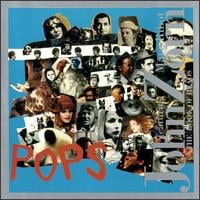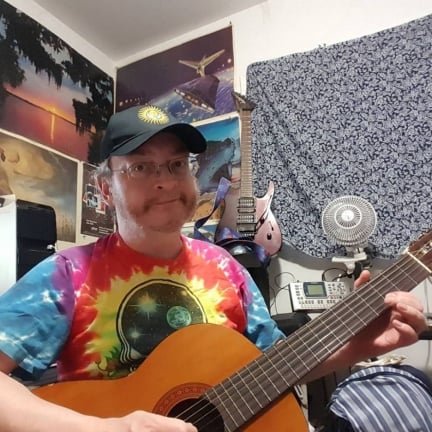Progarchives.com has always (since 2002) relied on banners ads to cover web hosting fees and all.
Please consider supporting us by giving monthly PayPal donations and help keep PA fast-loading and ad-free forever.
/PAlogo_v2.gif) |
|
Post Reply 
|
Page 12> |
| Author | ||||||||
Guldbamsen 
Special Collaborator 

Retired Admin Joined: January 22 2009 Location: Magic Theatre Status: Offline Points: 23098 |
 Topic: How do you measure innovation? Topic: How do you measure innovation?Posted: October 09 2017 at 11:06 |
|||||||
|
Is it innovation when the style of music that is being aped is unknown to the musician? I mean, I had no idea about prog rock back when I was in my early teens but after listening intently to Jimi Hendrix I came up with an interesting idea: 'man it'd be cool if rock musicians set out to make their take on something like Vivaldi's 4 Seasons'.
Like I said, I had never been subjected to prog beforehand and therefor had no idea that it had been done hundreds of times before. I think many musicians wind up sounding like old trailblazers yet without ever having come into contact with their material. Innovation pertaining to music is such a fickle thing and can happen inside small groups of people or indeed regions that are cut off from the western world. Edited by Guldbamsen - October 09 2017 at 11:07 |
||||||||
|
“The Guide says there is an art to flying or rather a knack. The knack lies in learning how to throw yourself at the ground and miss.”
- Douglas Adams |
||||||||
 |
||||||||
mlkpad14 
Forum Senior Member 

Joined: January 23 2017 Location: U.S. Status: Offline Points: 665 |
 Posted: October 09 2017 at 06:22 Posted: October 09 2017 at 06:22 |
|||||||
Jacob Collier definitely secured himself another follower. His theories are very interesting and innovative, and overall, they are just really cool. I am really liking his debut album, too. Also, I agree about the attitude being what matters. If an artist is trying to break boundaries and doing well, then they are worth following and repetitively listening to. However, if an artist accidentally invents this new concept, and they are not necessarily striving to be different, it is just an accident. Accidents are not inspiring. One of my favorite experimental vocalists of all time is Mike Patton. He has utilized every genre you can possibly think of, and more still. Additionally, he is really fun to listen to, and he is always collaborating with other experimental artists. Every album by him is an adventure. Another experimental artist I love is Lou Reed. It is a shame he passed away... His style was both very innovative, and emotionally compelling. Transformer and White Light / White Heat (The Velvet Underground) are my favorites by him. Surprisingly, I was also one of those few weirdos who really loved LuLu (Metallica).
|
||||||||
|
https://gamecrazyprofessional.weebly.com/
|
||||||||
 |
||||||||
HackettFan 
Forum Senior Member 

Joined: June 20 2012 Location: Oklahoma Status: Offline Points: 7946 |
 Posted: October 08 2017 at 17:40 Posted: October 08 2017 at 17:40 |
|||||||
|
||||||||
|
A curse upon the heads of those who seek their fortunes in a lie. The truth is always waiting when there's nothing left to try. - Colin Henson, Jade Warrior (Now)
|
||||||||
 |
||||||||
HackettFan 
Forum Senior Member 

Joined: June 20 2012 Location: Oklahoma Status: Offline Points: 7946 |
 Posted: October 08 2017 at 16:32 Posted: October 08 2017 at 16:32 |
|||||||
|
^Centimeters or inches?
|
||||||||
|
A curse upon the heads of those who seek their fortunes in a lie. The truth is always waiting when there's nothing left to try. - Colin Henson, Jade Warrior (Now)
|
||||||||
 |
||||||||
Slartibartfast 
Collaborator 

Honorary Collaborator / In Memoriam Joined: April 29 2006 Location: Atlantais Status: Offline Points: 29625 |
 Posted: October 07 2017 at 18:12 Posted: October 07 2017 at 18:12 |
|||||||
|
I prefer a tape measure.
Edited by Slartibartfast - October 07 2017 at 18:16 |
||||||||
|
Released date are often when it it impacted you but recorded dates are when it really happened...

|
||||||||
 |
||||||||
Lewian 
Prog Reviewer 

Joined: August 09 2015 Location: Italy Status: Offline Points: 14106 |
 Posted: October 07 2017 at 11:08 Posted: October 07 2017 at 11:08 |
|||||||
Hmm. On one hand it's probably very difficult these days to do something really new and innovative in this respect. On the other hand, while 11/8 and 13/8 and whatever have been done many times already, still the vast majority of music (or at least the vast majority of what people listen to) is 4/4 or perhaps 3/4. There may be a problem with focusing too much on innovation. I think there is a space opened by many ideas of the last, say, 120 or so years (which is a time span of which I think the concepts of originality and innovation became far more important in art and music) that is by far not explored enough. For a long time almost all music was made in a pretty restricted framework, either of accepted rules or of "habits" that had been used for generations. When originality and innovation became more central in the appreciation of art and music, it became less attractive to go somewhere where somebody else had been before, despite the fact that new ideas had opened spaces in which lots of things could be done, probably not to be branded "innovative" anymore and surely not as innovative as opening the space itself, but still with a potential to create very worthwhile new music that enriches the listeners. For this, musicians are needed who are not after innovation in the first place; there is far more than being either truly innovative or just following the pack. So I'm very keen on musicians who for example take unusual (but not anymore really original) time signatures and explore the space opened by them, just because there's potential - only I don't think that "innovation" is the right header for this. ("Experimental" may or may not fit; I think experimentation is an attitude that is surely helpful, but may not necessarily produce innovation.) Small somewhat misplaced illustration: I think that King Crimson's Discipline was a stunningly original and innovative album (of course potentially not knowing all influences that went into it), and Beat is pretty much their lowest rated album on PA - but I think Beat is great at exploring more of the space opened by Discipline, despite it surely not being as innovative and original as Discipline itself. For which some people put it down, I think (although of course some simply don't like it, innovative or not). |
||||||||
 |
||||||||
DDPascalDD 
Forum Senior Member 

Joined: August 06 2015 Location: The Netherlands Status: Offline Points: 856 |
 Posted: October 07 2017 at 09:41 Posted: October 07 2017 at 09:41 |
|||||||
|
^That's just a little difference I guess. I'd say experimental is more of an attitude where one aims for being innovative.
As for time sigs... Coming back to Jacob Collier again! https://youtu.be/b78NoobJNEo?t=10m58s (especially at 15:10) If you thought time signatures were milked out and were done inventing... They're not, watch.
|
||||||||
 |
||||||||
HackettFan 
Forum Senior Member 

Joined: June 20 2012 Location: Oklahoma Status: Offline Points: 7946 |
 Posted: October 07 2017 at 08:28 Posted: October 07 2017 at 08:28 |
|||||||
|
Can unusual time signatures still be innovative? They've been done before. Nevertheless, there are a lot of metrical combinations one can do within any given signature, given the wide palette of accents, rests, note durations, orchestrations, and mix of notes and percussive techniques (e.g. strumming muted strings and such). Surely all such combinations have not been exhausted. Does any difference remain between the experimentalism of 11/8 and 4/4? Is using a wider palette in and of itself more experimental or more innovative?
Come to think of it as I write, is there a difference between being experimental and being innovative? |
||||||||
|
A curse upon the heads of those who seek their fortunes in a lie. The truth is always waiting when there's nothing left to try. - Colin Henson, Jade Warrior (Now)
|
||||||||
 |
||||||||
moshkito 
Forum Senior Member 
Joined: January 04 2007 Location: Grok City Status: Offline Points: 16148 |
 Posted: October 06 2017 at 06:13 Posted: October 06 2017 at 06:13 |
|||||||
And this is the scary part of the whole thing. And it actually happened in music a lot ... even Bob Dylan was trashed when he took his folk music electric ... and likewise many years ago, and still in many cultures, the bringing up to date of the traditional music is not something that is appreciated. This is one of the biggest complaints I have, for example, of American tradional Native American music, most of which is dead and gone, and it does not help their history come alive. Because the instruments of today, are not the same as the instruments of yesterday, the whole thing sounds different, but is NOT, and still some traditionalists do not like the modernization of the sound, which, supposedly takes the feeling away from the music. Which is not true at all ... the instrument is just the medium that the music and its feeling is passing through. There is an example, of something that HAWKWIND did in "Electric Tepee" at the end, that I loved dearly, and it was the powow at the end of the record ... perfectly modern, done by a rock band, and making total sense, however not likely to be appreciated by a non Native, but this, on the 21st century is like saying that an American or European can not do African Rhythms and styles, which is, now ... a totally redundant and stupid idea and thought. Now let's have some fun ... take the electricity out and how much of the music is really "innovative" ... has it all become strictly about the SOUND ... or it is specifically about the MUSIC ... and this has not been defined in this thread.
Edited by moshkito - October 06 2017 at 06:15 |
||||||||
|
Music is not just for listening ... it is for LIVING ... you got to feel it to know what's it about! Not being told!
www.pedrosena.com |
||||||||
 |
||||||||
mlkpad14 
Forum Senior Member 

Joined: January 23 2017 Location: U.S. Status: Offline Points: 665 |
 Posted: October 06 2017 at 05:38 Posted: October 06 2017 at 05:38 |
|||||||
Yeah, a while again I started looking for "different". I listen to every genre, but the ones that stand out are the ones who are able to make new genres and change the way we view them. And there is so much music out there. You find something you like, you obsess over it... Eventually, you look deeper... Sometimes you think you are done... But you are never done... Maybe half a year later, you are reminded of that same material, and you realize that there just has to be some type of fusion between the two genres you have been listening to... It is a good feeling! Innovation is great, but music is more about "understanding" than anything... And then digging deeper... Yeah, that's what music is all about.
|
||||||||
|
https://gamecrazyprofessional.weebly.com/
|
||||||||
 |
||||||||
HackettFan 
Forum Senior Member 

Joined: June 20 2012 Location: Oklahoma Status: Offline Points: 7946 |
 Posted: October 05 2017 at 21:21 Posted: October 05 2017 at 21:21 |
|||||||
|
||||||||
|
A curse upon the heads of those who seek their fortunes in a lie. The truth is always waiting when there's nothing left to try. - Colin Henson, Jade Warrior (Now)
|
||||||||
 |
||||||||
HackettFan 
Forum Senior Member 

Joined: June 20 2012 Location: Oklahoma Status: Offline Points: 7946 |
 Posted: October 05 2017 at 20:53 Posted: October 05 2017 at 20:53 |
|||||||
|
||||||||
|
A curse upon the heads of those who seek their fortunes in a lie. The truth is always waiting when there's nothing left to try. - Colin Henson, Jade Warrior (Now)
|
||||||||
 |
||||||||
Frankh 
Forum Senior Member 
Joined: September 14 2017 Location: Schenectady NY Status: Offline Points: 214 |
 Posted: October 05 2017 at 12:01 Posted: October 05 2017 at 12:01 |
|||||||
Agree. However I would add this, and these are words already seen sprinkled liberally throughout this thread, and all over the site as a whole. Long ago decided what I wanted, want out of music is anything. Anything but the same old thing. The same old thing, the bane of my existence. |
||||||||
 |
||||||||
moshkito 
Forum Senior Member 
Joined: January 04 2007 Location: Grok City Status: Offline Points: 16148 |
 Posted: October 05 2017 at 09:56 Posted: October 05 2017 at 09:56 |
|||||||
It doesn't. But it tells you that TODAY, folks used a lot of electric equipment, and that what used to be a "classic spanish guitar" style of playing, was now being used within a rock context. This is very common. The folk scene in Great Brittain, in the late 60's and 70's went electric in a big way, and by the time you hear Steeleye Span do feedback and Fairport Convention create jams off the traditionals, you know right away that they also did that in the old days, without the aid of electricity. Music is simply a continuation of various feelings and tomorrow it will be something else, but the music, and its feeling, really remains the same. We have to be careful with this moment, and discussion, otherwise, WCarlos and Tomita don't fit, and they merely brought the old music to new ears and instruments. It's innovation in the sense that it is being done by new instruments or in a completely different way, but not innovative at all, since it is the same piece of music, and THUS ... just another interpretation of the music. Thus, Tomita or WCarlos would be the same piece, simply conducted by a different person. It could be considered "innovative" as was the case with Stokowski (mixing instruments and orchestra positioning for different effects), but in general, it should fall into a different take on the same thing. Lenny's versions would be different. Leinsdorf's versions different. Ozawa's versions different, and such. Innovation in this area, is hard to determine, and is basically an exploration of the listener's ears. Now, when you consider the very early use of the experimental synthesizer in the movies in the 1950's, that could be considered innovative, but then, if you were living in 1910, the movies were also innovative and insane. The real issue is that defining this without a historical perspective, breaks it down to personal tastes and knowledge of the history of the arts. Yes, Picasso and Dali could be considered very innovative, but that does not take into consideration what brought on the whole thing ... Picasso as a young man looking out the windows in Madrid seeing harsh violence and pieces of human meat on the streets (Guernica), or Dali as a young man, realizing that the ideas that we have were all melting and disappearing into oblivion ... by sheer weirdness and mindlessness. And later the film maker Bunuel, spent 40 years more doing the same thing! I am not sure that something is "innovative" simply because you and I have not heard it before ... and that is the major issue I have with this thread. Too much of it is based on very little, and only 20 or 30 years of music, when ALL OF THE ARTS, are the greatest example of what could be considered innovation or not.
Edited by moshkito - October 05 2017 at 09:58 |
||||||||
|
Music is not just for listening ... it is for LIVING ... you got to feel it to know what's it about! Not being told!
www.pedrosena.com |
||||||||
 |
||||||||
Lewian 
Prog Reviewer 

Joined: August 09 2015 Location: Italy Status: Offline Points: 14106 |
 Posted: October 05 2017 at 08:46 Posted: October 05 2017 at 08:46 |
|||||||
|
Although I don't disagree with you, I wonder how big a problem this actually is. I mean, Hackett's life is probably good enough materially, and I'm very happy that he still plays some wonderful guitar and even produces some new music. Ultimately, how important is it that he did it first? Good for him and for those in the know to know it, but ultimately we can move on and just listen to the music that we like, old and new, Hackett moves on and does what he loves to do now, and we all enjoy it regardless of where innovation X "really" came from and whether due credit was duly paid.
|
||||||||
 |
||||||||
HackettFan 
Forum Senior Member 

Joined: June 20 2012 Location: Oklahoma Status: Offline Points: 7946 |
 Posted: October 04 2017 at 17:42 Posted: October 04 2017 at 17:42 |
|||||||
|
||||||||
|
A curse upon the heads of those who seek their fortunes in a lie. The truth is always waiting when there's nothing left to try. - Colin Henson, Jade Warrior (Now)
|
||||||||
 |
||||||||
progaardvark 
Collaborator 

Crossover/Symphonic/RPI Teams Joined: June 14 2007 Location: Sea of Peas Status: Offline Points: 48702 |
 Posted: October 04 2017 at 07:12 Posted: October 04 2017 at 07:12 |
|||||||
I can agree with this. A variation on this: Another possibility is that of an innovation developed independently by two or more artists at the same time, or an artist developing an innovation without prior knowledge that it had been done before. Sometimes it's the one that gets the innovation out into the open first, rather than the one that actually does it first. Obscurity of the artist can be a disadvantage. I can't actually think of a real life example in music, but the invention of the telephone comes to mind.
|
||||||||
|
----------
i'm shopping for a new oil-cured sinus bag that's a happy bag of lettuce this car smells like cartilage nothing beats a good video about fractions |
||||||||
 |
||||||||
mlkpad14 
Forum Senior Member 

Joined: January 23 2017 Location: U.S. Status: Offline Points: 665 |
 Posted: October 03 2017 at 20:14 Posted: October 03 2017 at 20:14 |
|||||||
|
I don't have much to actually contribute to this thread, but this contains some very interesting material. I really enjoyed reading through it.
|
||||||||
|
https://gamecrazyprofessional.weebly.com/
|
||||||||
 |
||||||||
rogerthat 
Prog Reviewer 
Joined: September 03 2006 Location: . Status: Offline Points: 9869 |
 Posted: October 03 2017 at 18:46 Posted: October 03 2017 at 18:46 |
|||||||
Hard to tell. Depends on the context. For a guitarist, a micro innovation in guitar playing in an album may be very important but others may not attach the same importance to it. Even stylistic changes are contextual. As rock has grown older, every new stylistic change is arguably harder to attain because a lot of ground has been covered. Edited by rogerthat - October 03 2017 at 18:46 |
||||||||
 |
||||||||
HackettFan 
Forum Senior Member 

Joined: June 20 2012 Location: Oklahoma Status: Offline Points: 7946 |
 Posted: October 03 2017 at 15:48 Posted: October 03 2017 at 15:48 |
|||||||

 Edited by HackettFan - October 03 2017 at 15:52 |
||||||||
|
A curse upon the heads of those who seek their fortunes in a lie. The truth is always waiting when there's nothing left to try. - Colin Henson, Jade Warrior (Now)
|
||||||||
 |
||||||||
Post Reply 
|
Page 12> |
| Forum Jump | Forum Permissions  You cannot post new topics in this forum You cannot reply to topics in this forum You cannot delete your posts in this forum You cannot edit your posts in this forum You cannot create polls in this forum You cannot vote in polls in this forum |